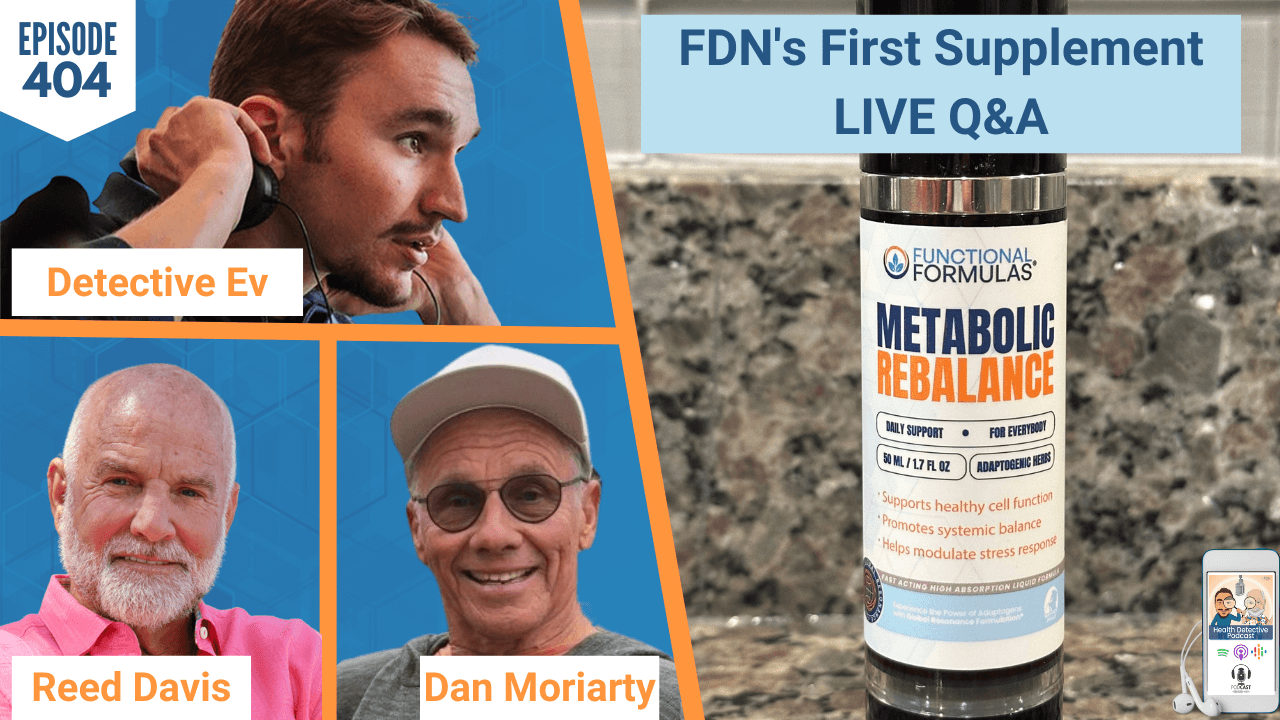Introduction
[00:00:00] Detective Ev: Hello, my friends. Welcome back to another episode of the Health Detective Podcast by Functional Diagnostic Nutrition. My name is Evan Transue, AKA Detective Ev. I will be your host for today’s show where we are talking about one of my all-time favorite topics in the world of health, and that is mastering sleep.

The reason this is so important to me is because I know that this is an essential part of healing. I think we all know that if you’re listening to a podcast like this. But it’s a little more nuanced than the average person might think. I talk to a lot of people in the functional space that are still under the belief system that eight hours is eight hours. Meaning that if someone just simply gets eight hours of uninterrupted sleep per night, well, it doesn’t really matter when it’s had. This could not be further from the truth.
I am someone who was doing that whole eight-hour thing from 1:00 or 2:00 in the morning until 9:00 AM or 10:00 AM. It wasn’t really working for me despite exercising regularly, eating super well, and being a young adult, which you would think would lead to me healing even faster from doing all the right things.
Certainly, I got results from this, but I didn’t get to where I needed to be. Then I switched this up to a 10:00 PM to 6:00 AM and started doing other things, which we’ll discuss in this podcast today. That is really what led me to getting to an optimal state of health. In terms of getting my health under control, I feel like this is one of the last things I did.
About Kelly Murray
Our guest today is Kelly Murray. She is a sleep coach for busy and ambitious professionals who are trying to do it all. She had a previous background in a Big 5 Consulting Firm and as a High Performing Medical Device Account Manager and Sales Trainer for a Fortune 500 Company. She did this for more than 10 years combined with her being a mother of two. She feels (and I agree with this) that this allows her to perfectly understand the everyday challenges busy professionals are facing today, especially when it comes to sleep.

As a certified Sleep Like A Boss coach, she combines physical and metaphysical know-how to help people with their insomnia using lab tests and stress resilient techniques to deliver the best outcome possible. She is also a speaker and has hosted customized seminars for major corporations, including Google, LinkedIn, Baxter Health, and Chapman and Cutler LLP.
She has also been featured on numerous media outlets, such as WGN, FOX Chicago, NBC Chicago, the Washington Post, Monica & Andy, Burt’s Bees Babies’, She Knows, and the That’s Total Mom Sense Podcast. (That’s a cute name.) She’s also an award-winning pediatric sleep consultant. She does both adults and children, which I thought was really cool. She has built her own successful business and team and helped over 1000 families worldwide get back to better sleep. We’re really glad to be talking to her today.
The Whole Family Needs Help Mastering Sleep
I love someone that can kind of go on both sides because the kid’s sleep thing is so huge. I was up to ridiculous hours in the morning (Well, night and morning, depending on how you look at it) when I was younger. I was never falling asleep. I didn’t have a TV in my room when I was younger. That wasn’t until I was a teenager. And there weren’t phones yet. That wasn’t a thing that people were using, not cell phones, at least. I still had these problems, and no one was really able to help me.

She can kind of serve both people here. Chances are (and I think this is why she words it as a thousand plus families that she’s helped) it’s not usually just one individual in the family that’s having these sleep issues. It’s kind of everyone is sleeping sub optimally. We all need to get that to optimal if we want to get to optimal health as well.
Without further ado, let’s get to the episode. All right. Hey there, Kelly. Thanks so much for being here with us today.
[00:03:49] Kelly Murray: Oh, my pleasure. Thank you so much for having me.
[00:03:52] Detective Ev: Yeah. I’m glad we get to do this. Sleep is one of my favorite topics and I know that’s something that you’re huge on. I actually think that this is kind of a missing link in the world of functional and natural medicine.
Mastering Sleep is Foundational
It’s not that people in the functional world don’t talk about sleep. Obviously, everyone does. But I don’t think people really understand how badly it’s been affected by our modern world. Just going to bed on time is not necessarily always the answer for people. It can get a lot more complicated than that.

It’s so important that if you screw up the sleep, I don’t care how good your diet is (I’ve experienced this myself.) you’re not going to get better. You cannot rest and restore without the sleep side. I’m excited to eventually get into that today. But we always start off with the same question on this show, especially when it’s a fellow Functional Diagnostic Nutrition practitioner that I’m interviewing.
That’s just, when did your health story start or what motivated you to get into this work? Because I find the vast majority either had their own health story or someone in their family or friend group kind of triggered them. So do you have your own health story? And if so, what did those symptoms look like when they started?
Mastering Sleep was Part of Kelly’s Health Journey
[00:04:53] Kelly Murray: Oh, yeah. I was definitely inspired by my own health journey. I became a sleep consultant after my son Braden, my second, wasn’t sleeping. He was this horrible sleeper and I’ve never been a great sleeper to begin with. So, him not sleeping and then my sleep issues on top of that, I was absolutely miserable. But I just trudged along because I thought, babies don’t sleep, and this is normal.
I’m a mom. I just kind of suck it up. But luckily my pediatrician educated me in the fact that that’s not the case. That babies can learn to sleep well. The fact that he wasn’t sleeping well was damaging in terms of his development. That it was potentially causing more emotional issues. And talked to me about the detriments of me not getting good sleep.
So, I headed his advice and decided to do what we call sleep training. It’s basically teaching him to fall asleep independently. It solved all of our problems, and he became this wonderful sleeper. I was then inspired to help other parents teach their children to sleep well through independent sleep. I was doing that for a couple of years.

Then all of a sudden, my sleep took a turn for the worst. I think a lot of it just had to do with the stress of running my own business, having young children, and not having very good boundaries. I was one of those types that was just working until 10, 11, 12 o’clock at night. I didn’t have any downtime whatsoever.
Becoming Certified to Help Others with Mastering Sleep
Lo and behold, I developed a really bad case of insomnia. Where there was one week where I literally almost every night probably only got two hours of sleep. I was absolutely miserable. I felt like this huge hypocrite. How could I tell families that sleep was important to their family when I wasn’t even sleeping myself?
So I decided to work with an adult sleep coach and we focused a lot on behavior changes as well as stress reduction and sleep hygiene. It worked really well for a while. Then my sleep issues came back. I was like, what the heck is going on? Here, I’m doing all the things that you’re supposed to be doing and I’m still not sleeping.
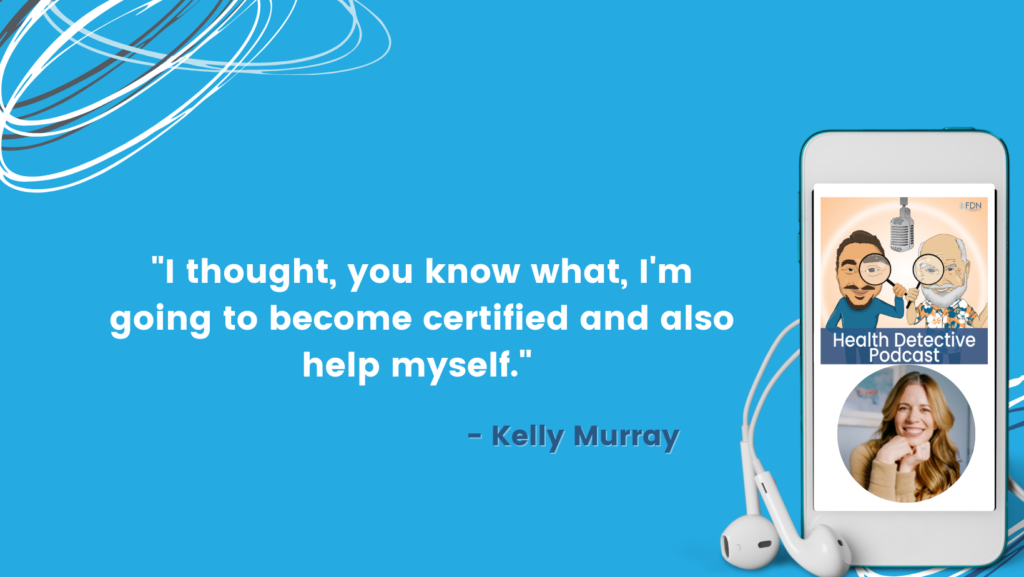
One of my colleagues talked to me about another sleep consultant that was also doing functional lab testing. She was actually doing a certification in her method. I thought, you know what, I’m going to become certified and also help myself.
After taking her course, running my own labs, working with her and healing, my physical health, my sleep was better than it had ever been before. I worked with her for a couple years and was just kind of craving more information. I knew that there was just so much to learn about functional lab tests. That’s when I discovered FDN and decided to take the course myself.
[00:07:43] Detective Ev: So, we’ve got a lot to unpack there right away. I actually want to start with just the fact that you mentioned practicing what we preach type of thing. I think some of us that get into this, myself fully included, we get so passionate about it, that it’s so easy to just start working these insane hours and doing all these things.
Mastering Sleep with Boundaries for Ourselves
I love what you said about boundaries. I have to constantly remind myself of this. The proof that I am not honoring my own boundaries is that we all have these subjective standards. So I never really go to bed past 10, but I will work sometimes, literally almost every hour from 6:00 AM to 10:00 PM.
It’s kind of funny how that works. That the world that’s somehow forcing me to work those 16 hours just magically shuts off at 10:00 PM when I want to go to bed and starts at 6:00 AM when I want to wake up. It’s almost as if I’m allowing it in those 16 hours. Then I could also allow it for 12 hours if that’s what I wanted to do, or 10 hours.

So, we got to set those appropriate boundaries and really make sure we’re honoring our own health with this. I’ve seen that definitely happen. It happened to me where my health kind of peaked and then it dipped down, certainly not as bad as it was before, but a little bit. I just started stacking on so much work because I was so excited about what we’re doing.
I definitely get that. I always like to ask and recognize with people. How did you even get into the world of functional or natural at all? Because normally most people don’t start there, even if it’s for your kid and they have something going on. Like how did you start with that and not just go to Western medicine and take a sleeping pill or something for this person?
Attempt at Mastering Sleep with Western Medicine
[00:09:10] Kelly Murray: To be honest, I did start with Western medicine. I went to my general practitioner who happened to be a friend. Before becoming a sleep consultant, I worked in pharmaceuticals and medical device sales, so I have lots of doctor friends. My general practitioner was a really good friend of mine, and I was telling her how I wasn’t sleeping.
She would prescribe me a bottle of Xanax. It would usually last me a really long time because my sleeping issues weren’t chronic. They were very situational. Whenever I was stressed, I couldn’t sleep. So, I would just take a fourth of a Xanax.
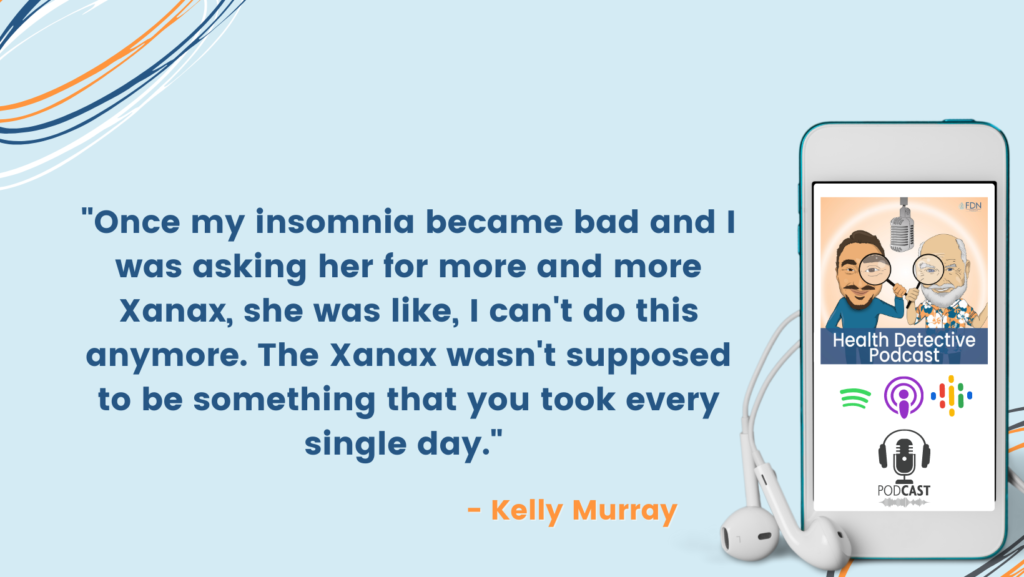
Once my insomnia became bad and I was asking her for more and more Xanax, she was like, I can’t do this anymore. The Xanax wasn’t supposed to be something that you took every single day. It was just supposed to be as needed. So, she cut me off. I was like, okay, well I guess I can’t do that anymore. That was like my quick fix.
I didn’t want to take sleeping pills, so that’s when I decided to look into more behavioral modifications. Being a pediatric sleep consultant, I knew that behaviors could make a huge difference when it comes to sleep. Then, like I said, it only worked for so long and my sleeping issues came back with a vengeance.
Luckily one of my colleagues knew about another sleep coach who was doing the functional testing and it was the missing piece when it came to adult sleep coaching. Meditate all day long and have perfect sleep hygiene, but if you have physical stressors that are hidden that you don’t address, or imbalances, you’re still not going to get adequate sleep until you address the physical side of things.
Mastering Sleep with Meds is not Mastering Sleep
[00:10:54] Detective Ev: Sure. Okay. Well, I’m glad I asked that. I didn’t realize that you had that kind of background in the pharmaceutical world, especially with the Xanax and stuff. People that listen regularly know me all too well with this. I had anxiety for a good portion of my younger life, and that was the recommendation.
You know what, it’s a shame, because in my opinion, Xanax is one of those drugs where Western medicine actually shines if it’s used properly. I think that’s a miracle drug for people. It works. It’s highly effective. Very quick. At low doses, there’s minimal side effects from it. Obviously we don’t want to be taking it long-term. We’ll start to get some problems really quick, but it can be wonderful.
Even for me, occasionally with flying, if I haven’t flown in a while, I like to use that because it helps me get back into the flow of things. I don’t like flying whatsoever. And it’s weird, if I’m flying regularly, I have no problem. But if I’ve taken like seven months off and then I start flying again, like during the pandemic, I always need something to kind of just chill it out because the stress is so much.

So, if it’s used appropriately like that, I think it’s a wonderful thing. But especially for sleep, if it’s getting used regularly, we both know that’s not even actually good sleep. It might be better than what we were getting, but it’s almost like we’re sacrificing some of the sleep cycles just to get one extra. Because if I’m not mistaken, dibenzodiazepine family suppresses REM, is that correct?
[00:12:10] Kelly Murray: Yes, that’s correct. And it’s acting more as a sedative.
You’re not getting that natural high quality sleep.
Mastering Sleep by Digging Deeper
[00:12:16] Detective Ev: Yeah, this is what I always tell people. Because I’m relatively young in this space. I’m like, you know, mid twenties. I have a lot of people that come up to me and they mean this so genuinely, they’ll talk about like marijuana and stuff. They’re like, well, marijuana helps me sleep.
Why can’t I use that? I’m not even using it during the day. I literally just use it at night. I say, well, that’s wonderful. I’m glad that it helps you sleep. But I’m someone that used that when I was a teenager, it was helping me sleep. That was true. But I actually look at it like this. If these things like Xanax or marijuana are helping you sleep, remember they’re suppressing certain sleep cycles.
So, if that’s happening and you feel like you’re getting better sleep, it’s not that those things are needed for you to get better sleep. You’re missing something. Like marijuana nowadays would not help me sleep. I would feel worse than I normally do because I’m getting good sleep. If I took the Xanax for the plane, I do not get better sleep than I normally do. I get worse sleep because it’s actually sacrificing some of those things.

If we need something, there’s no shame in that, obviously guys. But we got to get to the root cause. We got to figure out what’s going on like Kelly did and learn more about this stuff. You were getting into the sleep consulting, you’re doing all these things, and you’re figuring out your own health issues.
Gut Dysfunction Disrupts Sleep
We’ll kind of start with you first and then we’ll get a bit more general into the topic. What did you find specifically for you were some of those hidden stressors that you talked about that were things that you needed to address to kind of get your sleep back on track?
[00:13:32] Kelly Murray: It was a lot of gut dysfunction.

As I’m sure, you know, Evan, 70% of melatonin is produced in our gut as well as GABA and serotonin – all those great neurotransmitters that help us to sleep. I had a ton of gut dysfunction. It was a mess. It didn’t surprise me because I have celiac disease. I wasn’t surprised when my test came back looking like a Christmas tree. But I had a lot of dysbiosis.
I had H pylori, a parasite, candida overgrowth. Then on top of that, I had high estrogen. I was estrogen dominant.
[00:14:10] Detective Ev: Oh, geez. Okay. When did you get diagnosed with the celiac thing? Were you lucky enough to get diagnosed with that early? Or did that take a while?
Celiac Disease Diagnosis Before Mastering Sleep
[00:14:17] Kelly Murray: I was diagnosed probably about 15 years ago. It was really strange because I never had any stomach issues.
I would get these bumps called dermatitis herpetiformis on my elbows and my knees. I just thought, oh, well, you know, there’s just these bumps. You know, no big deal. I went through a very, very stressful period of time when I was working in pharmaceutical sales. That’s a whole other story. It flared up really bad.
I thought that it could have been the fact that I was running more. Whenever I’m anxious, I run. I figured it was from sweat. So I went to a dermatologist and she was the one who diagnosed me. She said, no, these bumps are from celiac disease. At the time, I mean this was 15 years ago, I had never heard of celiac disease.
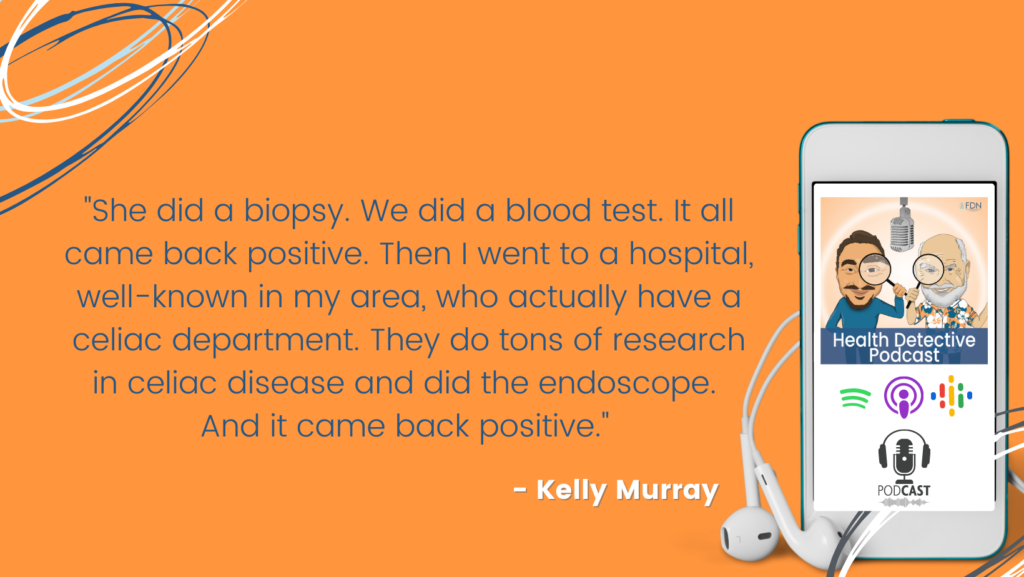
She did a biopsy. We did a blood test. It all came back positive. Then I went to a hospital, well-known in my area, who actually have a celiac department. They do tons of research in celiac disease and did the endoscope. And it came back positive. The funny thing after that is they just told me to stop eating gluten. It wasn’t really like a lot of education on what I needed to do to repair my gut.
I feel like that was really the missing piece is that I wasn’t taking probiotics, or eating fermented foods, or focusing on prebiotics, and doing all those things to close those tight junctions.
There’s No Mastering Sleep with Celiac Unaddressed
[00:15:39] Detective Ev: The celiac one is always so scary. People are trying to remove gluten and that’s fine. But then you learn about the world of cross contamination and all these things.
I remember reading this study one time and I might be misquoting the numbers by just a month or two. I know that it’s generally pretty spot on what I’m about to say. It was something along the lines of only 7% of those diagnosed with Celiac’s actually have a healed gut 18 months after the diagnosis. How crazy is that? People that get diagnosed are not actually told what this takes to really get to the next level with it. And then even scarier is that your story is actually so common.
I’m sure you’ve heard where celiac looks like anything but digestive issues. Everyone assumes that it would be that. I know so many people, being in the mental health space, that their celiac disease manifested pretty much only as neurological stuff or mental health stuff. Everyone’s treating that and never once looking at the fact that this person is exposed to gluten all the time and that’s really what’s causing their issues.
It’s a nasty little thing. I wish there was almost just a standard for testing everyone for this. I’m sure I’m being biased just because I know about this one thing. I’m sure everyone would say test everyone for their specific ailment. But man, that one, if it’s missed, just causes so many issues for people usually.

I’m glad that that was eventually found. Because yeah, without that, you’re never going to get the sleep under control or the other things under control probably. There’s always going to be like a lingering subpar level of health. You know what I mean?
Mastering Sleep in an Individualized Way
[00:17:06] Kelly Murray: Oh, yeah. It was amazing. As soon as I went on the gluten-free diet, the bumps went away. And my energy level skyrocketed.
I was always tired. At the time I was in my twenties and thought, oh, well, you know, just kind of normal. Everyone’s always tired. I remember too sitting at my desk and trying to focus and having very bad case of brain fog. Again, I thought that was normal. You know, everyone has a hard time focusing. But as soon as I cut the gluten out of my diet, it was like a whole new world.
I had no idea that my normal was not normal.
[00:17:40] Detective Ev: Nice. That’s wonderful.
So, from a general perspective with what you do now, because you work with both adults and kids, correct?
Kelly Murray: Correct.
Detective Ev: Awesome. Let’s talk about the approach. I come in; I have some sleep problems. Are there standard things that you’re doing with everyone? Is it individualized? How do you typically practice? We’ll break down some of that.
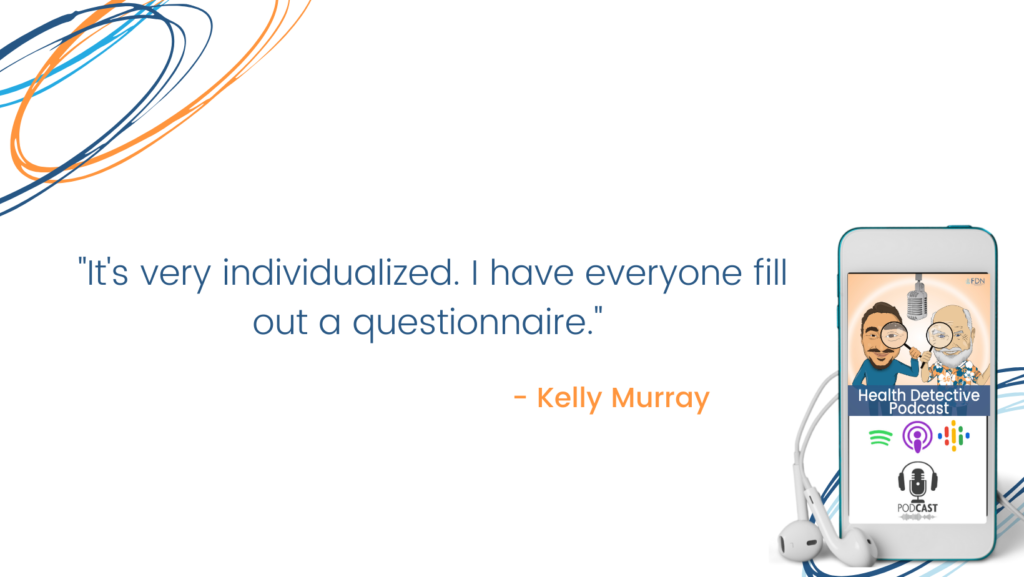
[00:18:00] Kelly Murray: It’s very individualized. I have everyone fill out a questionnaire. I first really dive into their sleep hygiene. Are they sleeping in a cool, dark environment? Is there anything we can do to up level their sleep sanctuary?
Then I also look at their bedtime routine. Are they avoiding blue lights, at least an hour to two hours before bed? Are they taking time to unwind? What are they doing to unwind? Then I’ll take a look at their day. What does their day look like? Are they in back to back meetings and not getting any rest?
Mastering Sleep Requires Taking Breaks

A lot of times that is a big part of my client’s sleep issues is that they’re Type A, workaholics that never take a break. They think that all they need to do is spend 30 minutes winding down at the end of the day and they’re going to sleep well. It’s really like dissecting their day and determining, okay, when can we fit in some breaks?
What are some things that we can do to help down-regulate their cortisol levels? Then I also look at their morning routine. Are they getting morning, light exposure? Are they spending time grounding themselves? So those are the basics I do with everybody. Then after that it’s really driven by the lab tests.
Junk Light Hinders Mastering Sleep
[00:19:19] Detective Ev: Very cool. I love that you brought up the light stuff already because anyone that listens knows I’m super passionate about that. That is definitely a missing part in the functional world that I keep trying to bring in here as much as possible and I know so many others are. We can’t ignore that, you know?
You could again, do all the diet stuff right, get to bed on time, whatever. But if you’re sitting in doors all day and the first thing you see is a screen, all day you’re seeing screens and artificial lights. Then the last thing before bed is a screen. Guys, that’s junk light, right?
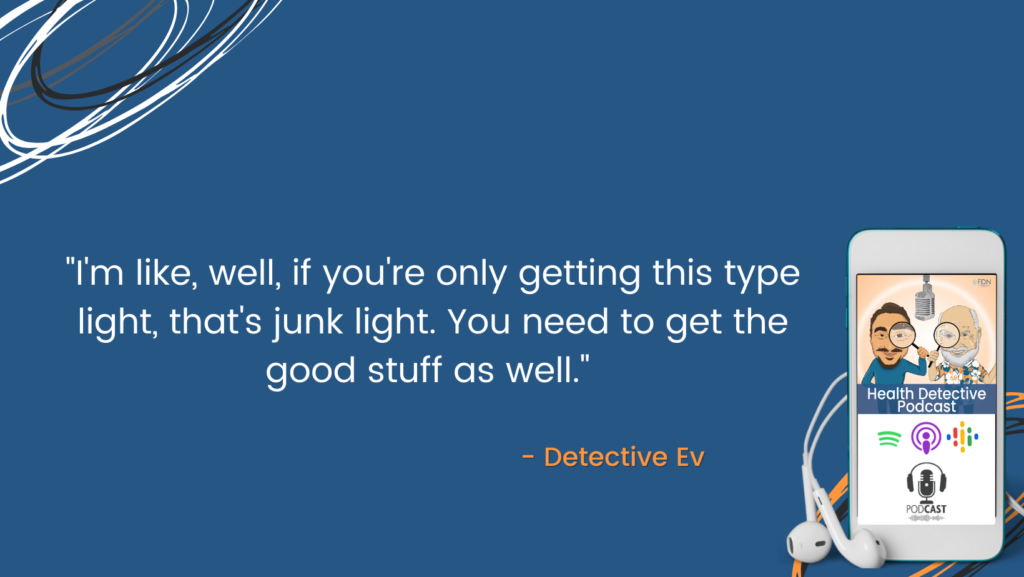
You wouldn’t eat McDonald’s for every meal. Why are you getting junk light for every minute of the day? I always try to describe it to people like that, because I think that makes them understand it a little better. They’re like, oh yeah, I wouldn’t go to McDonald’s every meal or really even at all for some of us, right? I’m like, well, if you’re only getting this type light, that’s junk light. You need to get the good stuff as well.
I like, from a general perspective, the stuff that you talked about so far, isn’t even super complicated. We’re not talking about some crazy lab test or some really expensive thing. We’re talking about, hey, getting habits right, getting your routine right. Because that stuff needs to be addressed first.
Mastering Sleep by Balancing The Things
And what you just said about the Type A personality, first of all, that relates to like every single person that comes on this podcast. It’s amazing. This isn’t even just for the sleep stuff. I find this to be so true in the chronic disease. If you’ll call it that just in general. I think this is happening because, do we have a bunch of terrible toxins and all this bad stuff in today’s world? Of course, we do.

Then when we add on to that the additional stress that comes from being a Type A personality, I think that’s why we see these people, like myself, getting affected first. We already had stress, then we have to deal with the modern world. Okay. You’re a ticking time bomb as far as I’m concerned. Maybe it’s a sleep issue. Maybe it’s something else, but yeah, I gotta be careful with that and learn to balance it.
How do you get into your client’s head to help them balance that? Because I know, and I might be projecting, but I’ve kind of seen this universally. A lot of us Type A folks don’t want to give that up. We feel like we’re not being productive, or we attach our identity to that. How do you get them in that mind state that they need to give some of this up to sleep better?
Mastering Sleep with Micro Shifts
[00:21:23] Kelly Murray: Yeah, it can be really challenging. In fact, I had a client today who has a high-power position. I was asking her, so how’s it going finding time to rest during the day? Have you been taking breaks? Her response was, well, I can’t with my job, I just can’t.
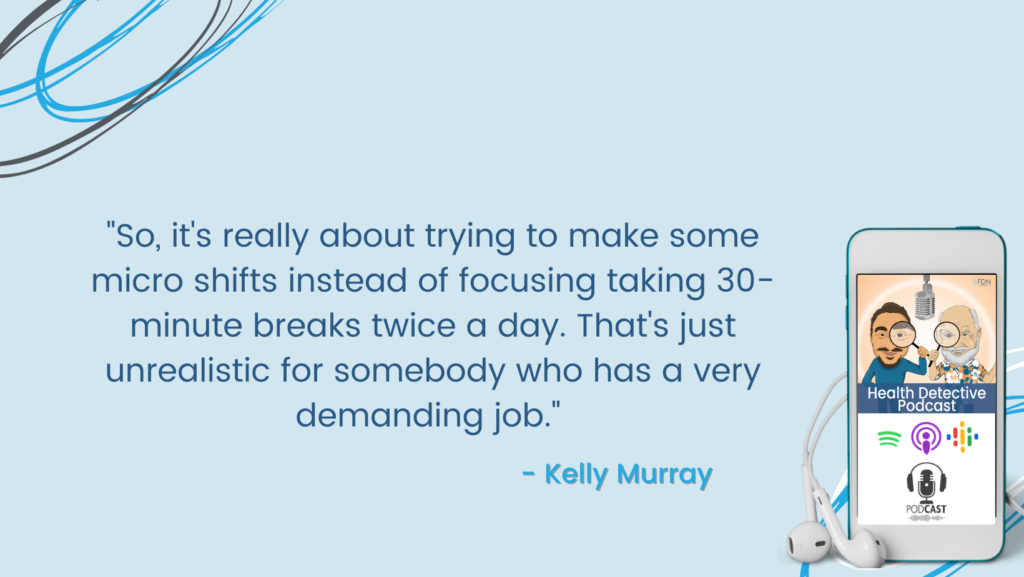
So, it’s really about trying to make some micro shifts instead of focusing taking 30-minute breaks twice a day. That’s just unrealistic for somebody who has a very demanding job. I think if I can just get them to take the first step. Well, if you can’t take breaks, how about after every meeting, you breathe? Do some deep breaths for a minute. If you can’t do a minute, how about three deep breaths?
Oh, also you have to go to the bathroom, right? Everyone has to go to the bathroom during the day. Can you commit to taking some breaths every time you go to the bathroom? I think by just incorporating some small little relaxation moments into their day, they start to realize, oh, wow! I do feel better after I take a moment to reset and wow, that really improves my energy and my outlook. I can tell my nervous system is back to that rest and digest parasympathetic mode. Then that motivates them to do more.
[00:22:48] Detective Ev: I think the good news about the Type A thing is if you can convince the person to get on board, they’ll do it better than anyone. They’ll structure that in, and they’ll get it done. It’s convincing them that it needs to get done first. That that can sometimes be the little tricky part about it. So, it’s bittersweet working with people like myself sometimes in terms of the health stuff.
Nonstop is Not Natural
[00:23:11] Kelly Murray: It’s hard too, cause a lot of times they don’t think that they’re stressed.

Well, I’m not really stressed. Well, yeah, you’re not emotionally stressed, but at the rate you’re working, you’re stressing your body. Think about back in the caveman days. Do you think the caveman worked really hard eight hours a day without taking breaks? No. They probably hunted a little bit, got some food, sat by the stream, relaxed. Working nonstop is not natural and it puts your body into that fight and flight mode.
[00:23:45] Detective Ev: Yeah, definitely not 14, 15 hours a day, which is quite common. I’m talking to myself a lot of times when I say this, I don’t want to sound like a hypocrite to anyone that knows me. I’m always trying to get better with this.
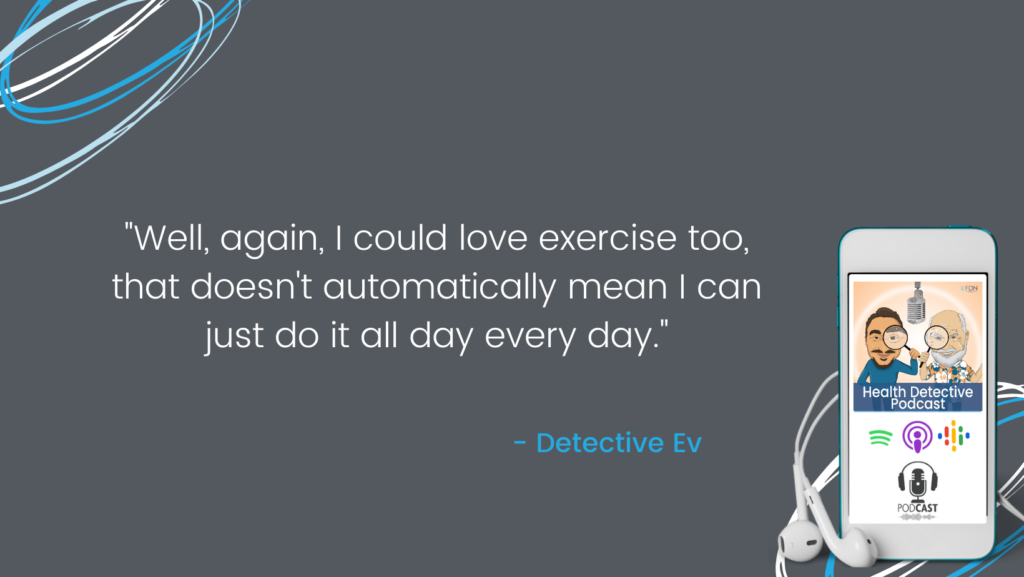
I think the way I try to relate this to myself constantly is that a lot of people like exercise, and exercise is a great thing. But even an Olympic athlete cannot do that 14 hours a day. What happens a lot in the health space, especially since I love what I’m doing. That is genuine and that is true. It’s like, okay, well, this isn’t work, so I’m just going to do this all the time. Well, again, I could love exercise too, that doesn’t automatically mean I can just do it all day every day.
Mastering Sleep by Listening to the Body
I’m curious, because this is something really new for me. I actually did a podcast on this solo with getting a Fitbit or an aura ring. Do you ever have your clients track stuff? I found the objective data for me and getting readiness scores, when I was seeing my readiness score, that’s what I needed to see to realize this is actually stressful on my body. Do you ever utilize stuff like that at all?

[00:24:47] Kelly Murray: With my clientele, I do not. They know they’re not sleeping well, and they’re feeling it. A lot of them have post-traumatic stress syndrome from not sleeping well. If you add a tracking device, it just increases their anxiety. So, I like them to listen to their body.
So, okay. You got a full night’s sleep last night. When you woke up, did you feel refreshed? Did you have a pretty constant stream of energy throughout the day? If so, then you got good restorative sleep. I do think it’s good for people who want to fine tune, who are already sleeping pretty well and want to take it to the next level.
But for my clients, they’re so anxious about sleep to begin with that it’s counterproductive. That’s something that I do work with them a lot on is their mindset when it comes to sleep and their relationship with sleep. It just perpetuates the issue because there’s just such a focus on sleep.
They have such a negative attitude towards sleep, which I don’t blame them. I was there. But if you’re constantly thinking about it, focusing on it, and talking negatively about your sleep skills, then it’s like a self-fulfilling prophecy.
Mastering Sleep with Objective Data
[00:25:58] Detective Ev: Understood. That’s actually really fair. For me, I’m not even sure how I’m going to end up using it long-term. Within the last month, I was feeling tired and busier than ever before. So, I got this Fitbit and it does the readiness score for you. The first time it was able to produce one, cause it needs several days, it was a 16 out of 100.
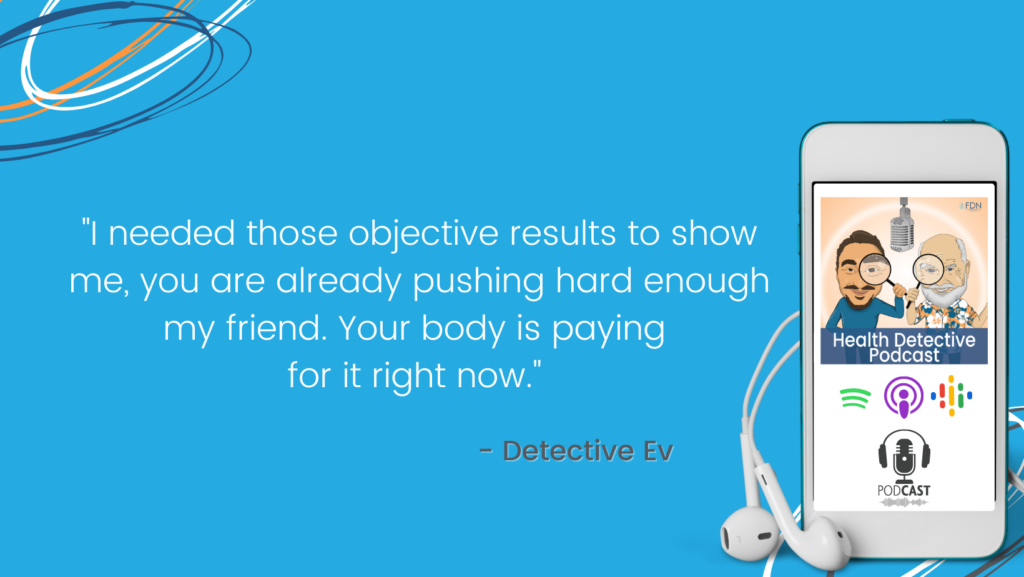
Now I’m traveling, sleeping in a hotel, speaking and stuff. I was like, wow! I’m thinking I just need to push harder, need to work harder. I needed those objective results to show me, you are already pushing hard enough my friend. Your body is paying for it right now. Then what’s really cool is, being in the health space as we are, it only took a matter of days of being back home before I had scores of 99 and even 100 on my readiness score.
What’s wonderful is I have the habits and tools in place to know what I’m doing. It’s just, I actually really liked this for me. It is a good thing for me because it reminds me, you did what you love today. That doesn’t mean that your body isn’t tired from it or that pushing harder is the answer to it. It’s okay to kind of chill out.
Now with the lab stuff, I’d love to know what you do lab wise, and even that gut stuff. We’ll get into that in a little bit. So what are some common things that you’re seeing on the labs that you utilize with your clients? Are there common patterns that you see with these people?
Mastering Sleep with Optimal Gut Function
[00:27:26] Kelly Murray: Across the board gut dysfunction. I want to say almost 99% of my clients have H pylori, which is fascinating.
[00:27:40] Detective Ev: I think they say 50% of the underdeveloped world and like certain parts of Africa have it. Then it’s estimated that I think like 20 to 40% here. I’ve always seen it since the day I joined FDN five years ago. 70 to 80% of the people I’ve ever worked with have it. Then you’re saying this amount have the sleep thing. I think that’s fascinating, especially as someone who’s had sleep issues and showed up for H pylori as well.
To the consumer, that might be a little confusing. Maybe they clicked on the FDN website listening to this and they’re like, wait a second. A gut bacteria is causing sleep issues? How is the stuff going on in the gut leading to the issues with sleep, Kelly?

[00:28:27] Kelly Murray: Gut function’s really important when it comes to sleep for multiple reasons. Your melatonin is mostly produced in your gut as well as GABA. Your gut is constantly communicating with your brain through the vagus nerve. Your gut actually has its own nervous system, all those little bacteria. That’s how they communicate to the brain. They tell the brain what’s going on with your general health.
Your gut is where you’re digesting your food and absorbing nutrients from your food. So, if you have gut dysfunction (your bad bacteria – opportunistic bacteria – outnumbers your good bacteria. Or you have a pathogenic bacteria like H pylori that’s really not supposed to be there. Or you have a parasite or yeast overgrowth.), then your gut can’t do all those things properly.
Mastering Sleep Using Labs
[00:29:29] Detective Ev: I think that alone is something so many people don’t look at first with sleep. A lot of us know about the gut and health thing. I still think gut and sleep is kind of a missing part. But remember guys, sleep is a part of health just like anything else.
What other labs are you typically utilizing? Obviously, you’re using some form of stool testing. Are you doing hormones and stuff like that?
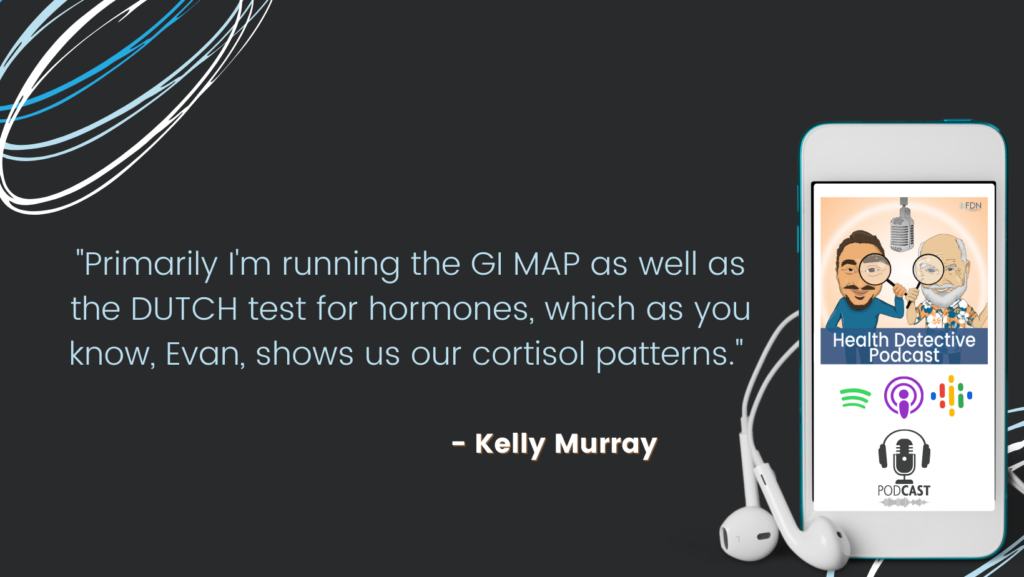
[00:29:52] Kelly Murray: Primarily I’m running the GI MAP as well as the DUTCH test for hormones, which as you know, Evan, shows us our cortisol patterns. Most of my clients have abnormal cortisol patterns, low cortisol, or high cortisol.
Then sex hormones, a lot of my clients have issues with their sex hormones. Either they’re imbalanced, too high or too low. In addition to that, liver dysfunction. I see a lot of liver issues. Liver issues can cause sleep disruptions. In Eastern medicine they say that three o’clock hour, if you’re waking up at that time, it’s your liver. That’s when your liver is working hard. I see a lot of that on the DUTCH test.
In addition to the DUTCH, I run the hair, tissue, mineral analysis. Also, food sensitivities. Then, last but not least, I have my clients take the Metabolic Typing diet tests.
Mastering Sleep using HTMA Patterns
[00:30:50] Detective Ev: Just to break this down really quickly for anyone interested in the FDN course side of things, we do not teach the DUTCH in the main course. We will start with something else just to kind of introduce you. Then there’s ad-ons you could take. Those are free there at the end of the course.
Then there’s even an advanced course that you can take to learn about the DUTCH that’s great. GI MAP is included. Food sensitivities is included. HTMA is actually something that we should be offering pretty soon as an advanced course, but we also have places people can learn that. Certainly, you can order it as an FDN.
A lot more people are coming in with an interest in the HTMA, the hair, tissue, mineral analysis. What are some patterns that you’re seeing on there? Any common things?

[00:31:31] Kelly Murray: A lot of issues with magnesium dumping where we really have to work on supplementing with magnesium. And the other three minerals that are forming minerals: magnesium, potassium, sodium, and calcium. A lot of imbalances there. That’s really what I focus on when I work with my clients. The HTMA will tell us if there’s heavy metal toxicity. I see a lot of heavy metals in my clients as well.
[00:32:01] Detective Ev: Then the food sensitivity one, I’m guessing that you’re seeing that they’re eating foods that they don’t even realize that they’re reacting to. That’s going to create a cortisol response, which is just one more stress on their body that they don’t need.
Mastering Sleep by Eating the Correct Foods
[00:32:18] Kelly Murray: I’ve had some clients where they’ve just removed the foods they’re sensitive to, and they’ve seen a huge improvement with their sleep.
[00:32:25] Detective Ev: It’s always a tough one because the food sensitivity test is either a complete hit or a mess. I only hear one extreme or the other, and I know it’s always working. If someone’s having an immunological response to foods and they’re eating those foods, we want to remove those. At least temporarily while we get things under control. But I’ve heard miracle stories from that test alone.
Someone runs it as a standalone and they’re like, oh my gosh, this got better or resolved completely. Then others will spend the money and they’re like, well, you know, it didn’t really do anything. I think it’s always best to do it how you’re doing it – running in conjunction with a few separate things. I hope that’s a good lesson for people out there that try to do the standalone testing. It’s always good to mix in a few different things.
Then Metabolic Typing. Not that we need to dive too deep into that pattern wise, but do you think that’s having a shift in people’s sleep when they get the right Metabolic Type down?
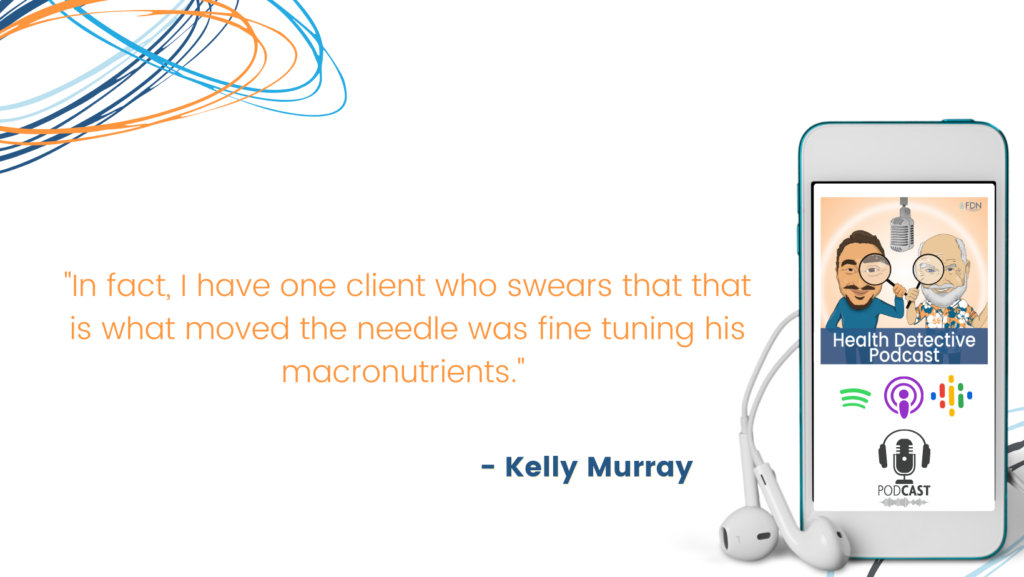
[00:33:24] Kelly Murray: Oh yeah, absolutely. In fact, I have one client who swears that that is what moved the needle was fine tuning his macronutrients.
Mastering Sleep by Balancing Blood Sugar
That’s the nice thing about the Metabolic Typing diet. It focuses on eating the macronutrients that are appropriate for your metabolism. By doing that, you’re going to stabilize your blood sugar.

That’s going to help you sleep because whenever your blood sugar bottoms out, your body’s going to produce cortisol to bring it up. If you’re on the blood sugar rollercoaster during the day, it’s going to happen at night. And in the middle of the night, if your blood sugar bottoms out and you get that cortisol response, that’s going to wake you up.
[00:34:08] Detective Ev: To me, the blood sugar one, you would think is more of a simple one. I feel like this is another thing in our space where people get so deep into the labs that we forget this is important. The blood sugar thing is one of the most important and overlooked things that I see all the time.
Even in the FDN course, this is talked about. Somehow people forget that that was thrown in there. This is a big part of the course. Reed says right in it that people should buy a glucometer. I have one at my house. I also have like a meter for blood ketones. I think people should be tracking that stuff all the time. If you don’t get that stuff under control, there’s always going to be weird little things popping up.
Outside of the labs that you’re doing with people, we kind of already alluded to certain things like morning light, blue light, all that kind of stuff.
Mastering Sleep with Light Data Our Eyes Collect
I’d love to dive into those tips even more in depth and anything else. Are there some straightforward things that you believe everyone should be doing? I’m going to guess that you don’t have certain clients just shouldn’t be getting morning light. Every client should be doing that.
So, could we just kind of break down for people that might not be familiar with that? Why would light in the morning help my sleep at night? I think some people are unaware of why that might be.
[00:35:17] Kelly Murray: It is something that’s not well known. I feel that it’s gaining more popularity now that Huberman is talking about it a lot.
Do you listen to the Huberman Podcast?
[00:35:29] Detective Ev: I’m vaguely familiar with it. I got introduced to morning light by like Dr. Jack Kruse, about five, six years ago.
[00:35:34] Kelly Murray: You have to listen to his episodes too. It talks all about this. It’s fascinating!
He is an optometrist and also a neuroscientist out of Stanford. Basically, I learned a lot from listening to his podcast about how important light exposure is. In our eyes we have neurons that are actually part of our brain, and these are constantly collecting data from our environment, especially light data.
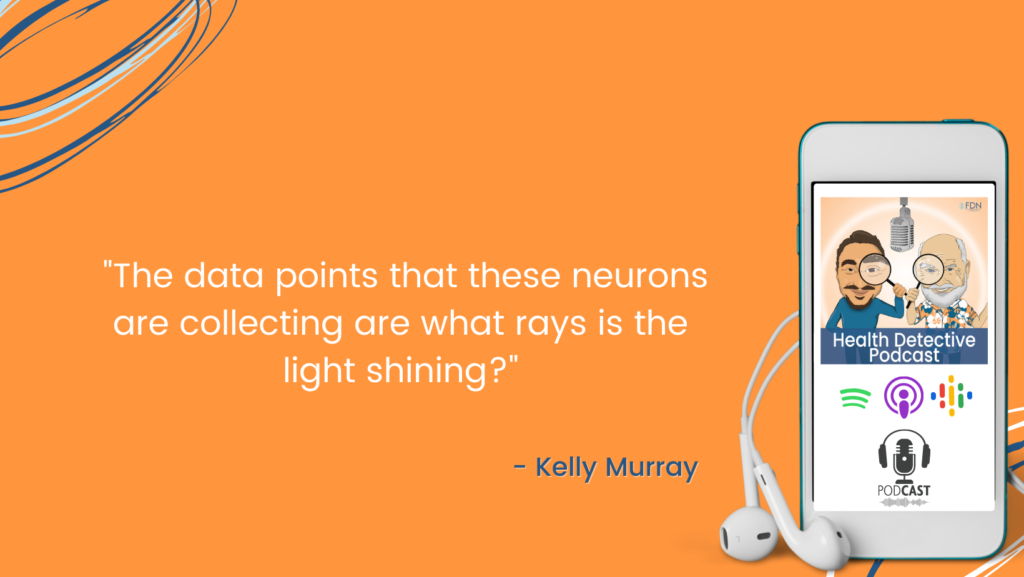
The data points that these neurons are collecting are what rays is the light shining? Is it mostly blue light? Or more amber lights? Blue light is in the morning and how you wake up. The sky is so bright. That’s because of the blue lights. Then in the evening around sunsets, the rays are more amber. That is going to cue your brain to keep biologic time. So that’s one data point.
Mastering Sleep with a Nice Cortisol Response in the Morning
The other is the direction in which the light is hitting your eyes. Is it hitting from above or is it hitting at a 45-degree angle? If you think about it in the morning for sun rise and even in the evening, sunset, the lights coming at you r eye, more at a 45-degree angle, and then also the intensity.

Our body is expecting to see sunrise. Our body is expecting to see the blue lights, the light coming in at the 45-degree angle, it being a little bit dim and then getting more intense. That’s going to tell our body that it’s morning. And as a result, that signal is going to tell our body to produce cortisol.
So, you want to have a nice cortisol response in the morning. You want your cortisol levels to rise so that they then rebound the rest of the day. Also, what that’s going to do is tell your body to start producing melatonin about 13 hours later. It’s really important if you can, to try to get that exposure within 30 minutes of waking up.
And if you wake up before sunrise, I tell my clients to sit in front of a happy light and it can have a similar effect.
Catching Sunrise Helps with Mastering Sleep
[00:37:53] Detective Ev: Awesome. Probably one of the topics I’m most passionate about spreading.
I was just doing something for FDN in Vegas this weekend, where I was talking about the light stuff, because it’s free. It’s literally free. All you gotta do is go outside. We all have some ability to go outside some part of the day.
It’s important enough for me that if I work with an individual nowadays (And just to be clear for people it’s all local. I don’t work with anyone online. So go through FDN or go through someone like Kelly.), I will tell them if they are not currently able to catch sunrise or anywhere even close to it, I asked them, what’s the plan so that we can literally switch your life around to be able to do that.
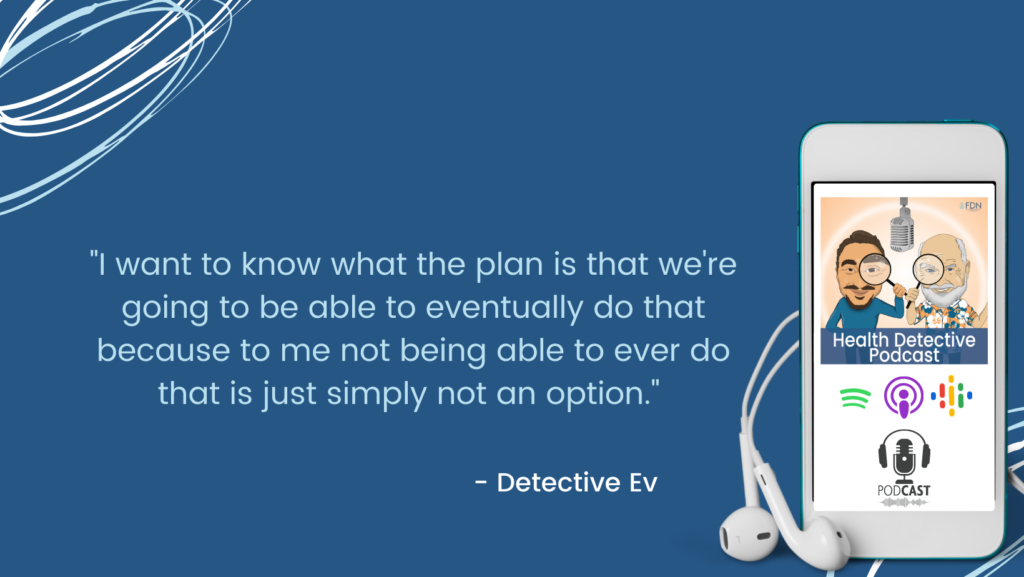
I don’t care if it takes a year. I want to know what the plan is that we’re going to be able to eventually do that because to me not being able to ever do that is just simply not an option. This was one of the biggest things for me, health wise.
Catching Sunrise is a Wonderful Travel Hack
Also, as a cool travel hack, it’s one of my biggest secrets to not getting jet lag. I just catch the sunrise wherever I’m at. And I really never feel it. I mean, I just hopped three hours. For the time zone. And I guarantee I will get to sleep perfectly on time tonight. And I was getting to sleep perfectly on time the last several days in Vegas.
I mean, is it a good idea to probably be drastically altering the sunrise time, multiple hours? Probably not. I’m not saying that this has no effect on the body. I’m not ignorant. However, it does seem to almost immediately work at least in terms of being able to get to bed at the time that you’d like to get to bed.

There is nothing worse than hopping three hours behind, and then, you’re staying up super late. Then of course, if you’re traveling, probably for either vacation, so you want to do something fun the next morning, or you’re doing business, so you have to be up the next morning. The last thing we want to be doing is not getting good sleep on the road. At the very least, it’s a wonderful travel hack too, is catching that sunrise every day.
Now with the light at night, I think this is a little bit more of a commonly known thing. I still like to know how people apply this specifically for their clients. Do you recommend any type of glasses? Are you just more of like a purist where you’re like, I want abstinence?
Mastering Sleep by Blocking Light at Night
You mentioned like an hour or two before bed. So, what are typically the recommendations you’re giving to clients? I’m not asking you to give away the secret sauce, just maybe one or two things that you would tell them to do to kind of better their sleep at night and reduce that blue light.
[00:40:09] Kelly Murray: I really customize it based on my client. What are they doing currently and how can we improve upon that?
A client who is really anxious, who isn’t doing anything to minimize blue light, I’m not going to tell them, okay, no blue light for two hours. And I want you to wear blue blocker glasses that blackout 95% of the light. That’s going to be too extreme for them. I like to start small. Like, okay, can you commit to avoiding screens for at least 30 minutes? And even that can make a huge difference.
My clients who are already doing that, say they’re avoiding light for 30 to 60 minutes. I like to take it a step further and say, okay, can we work on avoiding it for longer, maybe an hour and a half, two hours?
And if you’re watching television at night, can you wear blue blockers that blackout 95% of the blue lights? A lot of people wear daytime blue blockers, and they think that they’re doing the job at night and they’re not. You need special nighttime blue blockers that have the orange lenses, orange or amber yellow lenses.
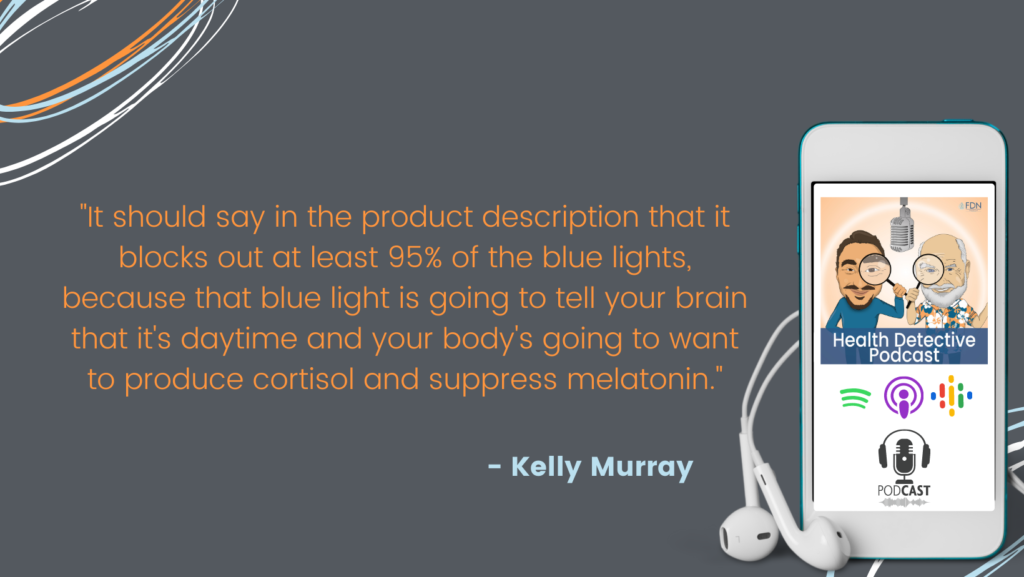
It should say in the product description that it blocks out at least 95% of the blue lights, because that blue light is going to tell your brain that it’s daytime and your body’s going to want to produce cortisol and suppress melatonin.
Mastering Sleep – Meeting Clients Where They are At
[00:41:28] Detective Ev: So many things, Kelly, of what you’ve said today, show that you’re a really good coach. I love how the recommendations are customized to the individual where they’re at. Admittedly, that’s somewhere I struggle. I’m kind of just like, hey, let’s go all in and do this. I need to remember what you’re talking about more because I never started a hundred percent with anything.
I’m someone who now literally year-round puts on blue light blocking glasses, the full-out red ones. I get ones that actually block 99%. I don’t think that we can get a full 100% yet. I haven’t seen that actually shown on a spectrometer. But I have seen some for 99%, so I get those. I put those on immediately at sunset and sometimes the sun sets at 4:45 in the afternoon in winter where I live. I will still do that. But it didn’t start that way.
I started with the Uvex glasses, off Amazon. They only block like 70%. I thought I was doing the best thing in the world. I only put them on all like an hour or two before bed. I was still going to bed at one or two in the morning at the time, you know? So, it’s perfectly okay to meet someone where they’re at. I certainly wasn’t at that level I’m at now, before, and then all of a sudden over time it gets better and better.

It’s just kind of a self-fulfilling thing. I think when we see things that work in our own life, we have a tendency to want to do them more. So, it’s wonderful to meet someone where they’re at and then they’re like, well, hey, this is working. So why would I not pursue this even more?
Mastering Sleep – Getting the Sunset
[00:42:45] Kelly Murray: Absolutely. Another thing you do to, Evan. Have you been going outside during sunset?
[00:42:51] Detective Ev: Yeah, I typically try to do that. I always have a window cracked. I am absolutely religious with the sunrise. I am not as religious with the sunset, but I am pretty good with that one too.
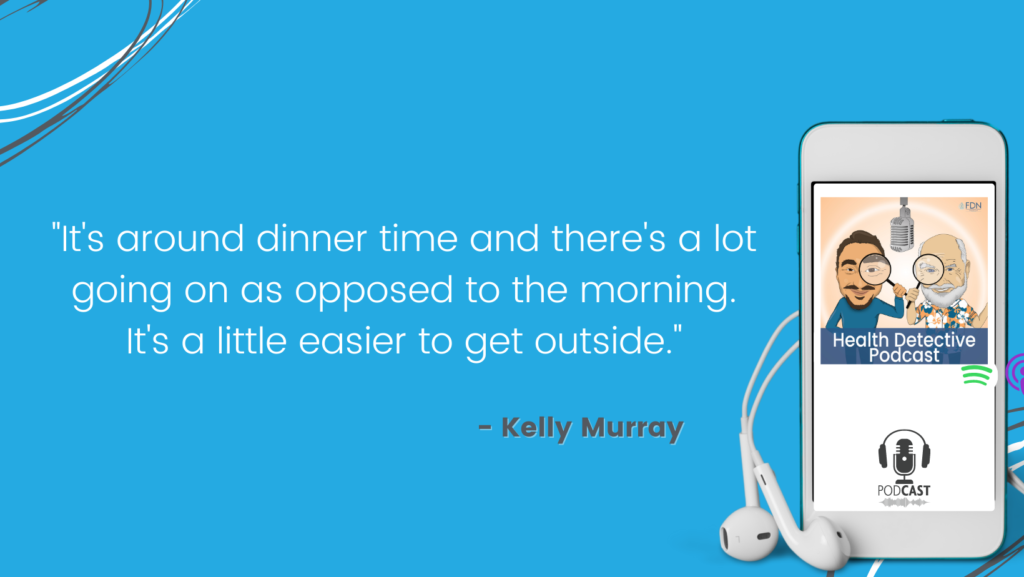
[00:43:03] Kelly Murray: Yeah. It’s kind of hard because you get busy. It’s around dinner time and there’s a lot going on as opposed to the morning. It’s a little easier to get outside.
[00:43:11] Detective Ev: Yeah. And I’ve also tested it. There’s no denying that that’s what nature intended. And it’s completely different than just throwing on blue light glasses.
For me, it seems like if I miss sunrise, it’s so obvious it’s not even funny. It’s a slap in the face, this was not a good idea. Whereas if I just try to dim things progressively and then when the sun officially sets, I put on those reds. It doesn’t seem to really make a huge difference for me. But what I need to do is give a good 30 days to the sunset thing as well.
I’d love to know what that does, especially now that I’m tracking things. I finally got one of those Fitbits or eventually if I get an Oura ring and upgrade a little bit. I’d love to know what a full 30 days would look like because I’ve never done a full 30 days of sunset. That’s for sure. Not in the way that I would have wanted to. So that’s a great point.
Mastering Sleep – More Time Outside in General
Then of course, just getting mid-day light’s good as well to constantly remind the body what time of day it actually is. Because guys, even if we’re inside on the screens and we’re blocking the stuff, it’s still not letting our bodies know what time of day it is technically. We are so far away from being able to mimic that thing that nature gave us – the sun – with our screens. I mean, we’re not even close. We got to go out for light breaks as well and remind our body, oh, hey, it’s the middle of the day. Oh, hey, it’s midafternoon. Oh, hey, it’s sunset, right?

[00:44:29] Kelly Murray: Yeah. The more time you can spend outside, the better, especially since sunlight helps your body to produce serotonin. Serotonin is the precursor to melatonin.
[00:44:38] Detective Ev: Yeah, absolutely.
As we kind of wrap up here a little bit, I want to make sure we touch on a few things. One is simple. Where can people find you? I love that you work with both the kids and adults. I think, especially with the kid’s thing, there’s so many people that listen to this that would really want to talk to someone like you.
Where to Find Kelly & Get Help with Mastering Sleep

So where can people find you?
[00:44:57] Kelly Murray: For pediatrics, you can find me at kellymurraysleep.com. That’s my website and also my Instagram handle. And then for adults, it’s kellymurrayadultsleep.com. And that’s also my Instagram handle as well. I like to separate the two because a lot of people who are focusing on their kids sleep don’t want to hear the adult tips and then vice versa.
Becoming an FDN Strengthens Kelly’s Confidence
[00:45:19] Detective Ev: Fair enough. I think that’s awesome that you do that. We will have that in the show notes. Of course, guys, for people that are interested in the FDN course, I’m going to spend the last like six minutes here, just asking Kelly some FDN type questions. So, if you feel like you got everything that you needed, then you know the links and where to find her
A few quick things about FDN itself since we’ve kind of shifted this podcast over to the core side, because that’s just what people wanted. How has joining FDN and becoming a practitioner affected your business and just career with this? Because I feel like this is a fundamental part of what you’re doing is because of the access to the labs with FDN and stuff. How has it positively affected you?

[00:45:57] Kelly Murray: Before taking the FDN course, I was working on someone’s team, and she was ordering the lab tests and helping me interpret them. And I never felt a hundred percent confident when it came to consulting with my clients. And I knew I wanted to take the course because I wanted to know all there was to know about the lab tests and the protocols. And once I did, everything kind of made more sense. All the pieces really fit together nicely.
FDN Taught Kelly – The Body’s Interrelated
I think that’s a nice thing that Reed does. He really explains how gut dysfunction can cause hormone dysfunction, and how food sensitivities can cause gut dysfunction, how everything is interrelated. I think that was one of the biggest takeaways is that you can’t just focus on healing one area.
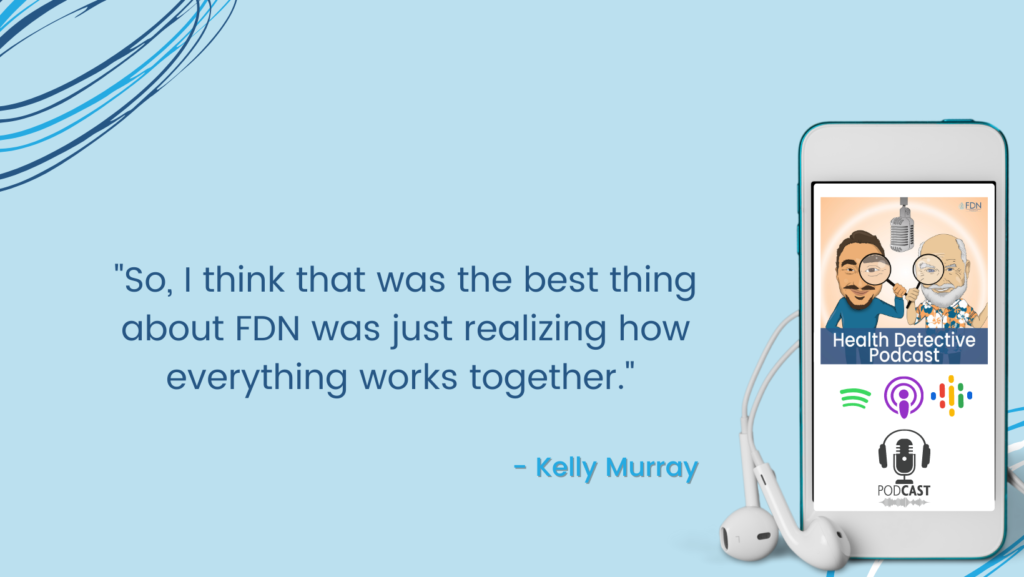
I was tempted before to just focus on the gut. Oh, well, if we healed the gut, everything is going to be okay. But that’s not the case. If it started with gut dysfunction, it’s going to cause dysfunction in other parts of the individual’s body and in their system. So, I think that was the best thing about FDN was just realizing how everything works together.
[00:47:14] Detective Ev: Cool. And I know that, if I’m not mistaken, you are a part of AFDNP, correct?
[00:47:18] Kelly Murray: I am, and I love it. I love being part of the Facebook group and going out there asking questions, it’s really just increased my confidence. Because I know that I have a whole group of practitioners that have my back and have a ton of experience.
[00:47:31] Detective Ev: You’re kind of beating me to it, cause that was my question. Anyone that’s a part of AFDNP knows this. I mean the community here, this is unmatched. And I keep having to ask people just to prove that this is actually true. Because what business is not going to say that their community’s the best? No. FDN community is unlike anything I’ve ever been a part of. Maybe there’s something better out there and I don’t know about it. Fair enough. But I think this is one of the most supportive groups ever.
Strong Support in the FDN Community
Have you found a lot of benefit, like you said, from being a part of the community? Kind of knowing that you can go to this group anytime that you have a question that maybe you don’t know the answer to or something?

[00:48:05] Kelly Murray: Absolutely. Especially being a newer FDN, it’s hard to know it all. It’s all about experience. It’s so nice to be able to survey the group, to learn from their experiences with situations that are similar to what I’m faced with, with my clients.
[00:48:26] Detective Ev: Yeah. There’s like someone in there who’s, who’s done it all.
And one of my favorite parts about being in that group is we have people of all ages that do FDN. I mean, early twenties now, too. I’ve seen people go through at 60 and 70. It happens actually quite frequently. It’s an amazing thing because this is something that just calls people.
What I find really cool is that when I go in there, sometimes I have someone answering that’s been in the functional/natural space longer than I’ve been alive. For them to bring that expertise and just know that they were on the front lines of this before I was even dealing with these problems because I wasn’t here, that’s amazing.
It’s encouraging. I’ve never found something that I couldn’t get the answer to from one of those people in that group. We’re coming from so many backgrounds, PhDs, personal trainers, acupuncturists, doctors of all types, and you never know what you’re going to get in there. Everyone’s really passionate about what we’re doing. I think it’s wonderful and we’re of course, glad to have you as well.
Signature Question – Magic Wand
Now, Kelly, I want to finish up today with the signature question that we ask on the Health Detective Podcast. And it’s not a trick or anything, but it’s always a fun one.
The signature question is this. If in this case I could give Kelly a magic wand and you could get every single person in this world to do one thing for their health, whether that’s literally do one thing or stop doing one thing, what is the one thing that you would get them to do for their health?
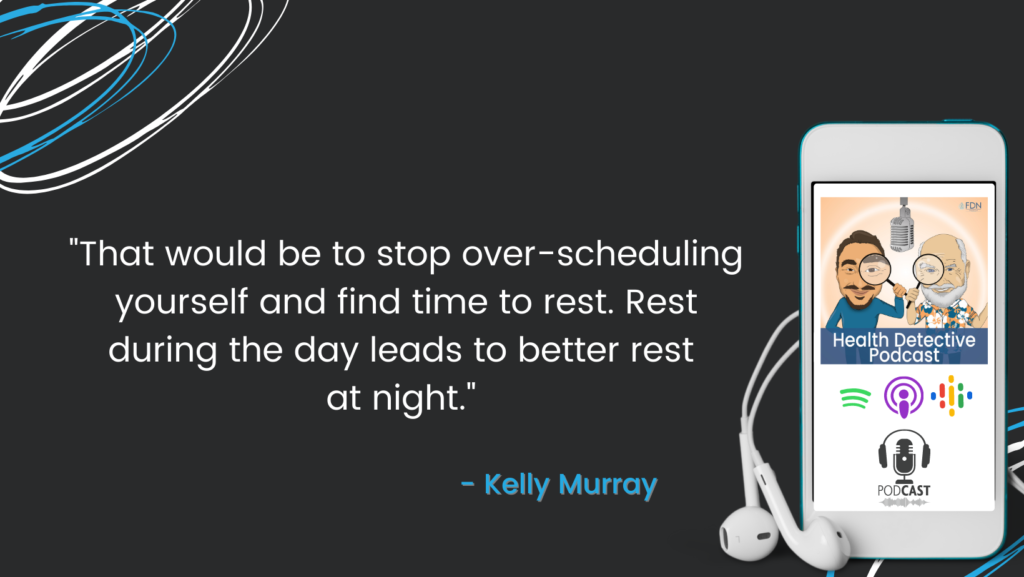
[00:49:52] Kelly Murray: That would be to stop over-scheduling yourself and find time to rest. Rest during the day leads to better rest at night.
Conclusion

[00:50:06] Detective Ev: All right, guys. Thanks for listening to another episode of the Health Detective Podcast by Functional Diagnostic Nutrition. And a special thanks to Kelly for hopping on with us today. If you need help with sleep, you know exactly who to reach out to. Just check out these show notes and we will have Kelly’s links down there.
Alternatively, though, if you’re someone who is looking to actually do this work and help people with their sleep or any of the other thousands of chronic health issues out there, then head on over to FDNtraining.com. Or you can go to functionaldiagnosticnutrition.com. It’ll send you to the same place. When you are there, not only can you get more information about the course, but you can also click the “book a call button” and schedule with one of our course enrollment advisors. They answer any questions that you might have.
We’re really particular about who we’re bringing in. There are a lot of programs out there and the program is not perfect for everyone. It’s perfect for some people, but not for everyone. We really want to make sure that before you make the investment, that you are the ideal person for this and that we’re going to be able to meet your needs.
So again, FDNtraining.com. Click the “book a call button” and schedule with whichever advisor resonates the most with you. I say it that way because they actually have their stories on there in summary so you can kind of see what they went through. If there’s someone that relates to more than not, you can feel free to book with them.
I’m looking forward to talking to you guys again soon, but until then take care.




